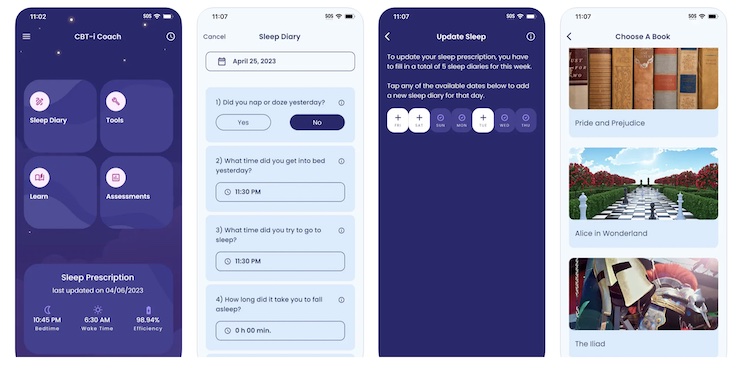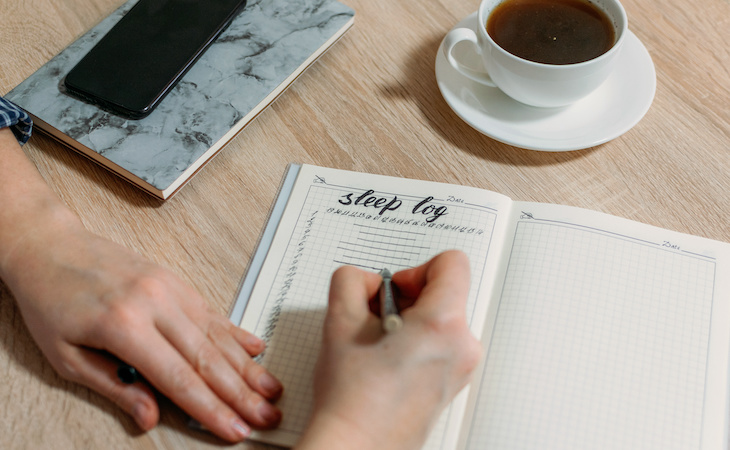If you’re having trouble sleeping—and you’re not sure why—then there are several different tools you can use to try to get your sleep back on track. One of those tools? A sleep-tracking journal—also known as a sleep diary.
Sleep diaries can be a helpful way to dig into your sleep patterns, identify what might be going wrong, and figure out the right plan to fix it.
Let’s take a deep dive into everything you need to know about sleep diaries—including what they are, how to use them, and how they can help you get better sleep.
What is a sleep diary?
“A sleep diary—also called a sleep log—is a detailed log used to track various aspects of an individual’s sleep pattern,” says Shantha Gowda, licensed clinical psychologist, diplomate in behavioral sleep medicine, and member of Saatva’s advisory panel.
With a sleeping journal, you track different elements of your sleep each morning—for example, how long you slept, if you were awake for any significant period, and how refreshed you felt upon waking.
You can start your own sleep journal from scratch or use an existing resource—like Consensus Sleep Diary or CBT-i Coach.
“A sleep diary—also called a sleep log—is a detailed log used to track various aspects of an individual’s sleep pattern.”
Shantha Gowda, licensed clinical psychologist, diplomate in behavioral sleep medicine, and member of Saatva’s advisory panel
“Diaries are filled out daily, which provides prospective information about an individual’s sleep habits and patterns over time,” says Gowda.
Sleep logs are essentially made to help you collect data; a sleep diary is “primarily used for assessing sleep quality and quantity, making it a valuable resource—for individuals and sleep specialists working with patients,” says Gowda.
Why should you use a sleep diary?
Using a sleep diary can benefit your sleep in a variety of ways, starting with bringing more awareness to your current sleep habits—which can help you identify what’s not working and start taking steps to change it.
“Completing sleep diaries can be helpful as it increases your awareness of your sleep and can naturally facilitate some changes,” says Gowda.

For example, after tracking your sleep for several weeks, you may notice that, as you get later into the week, your bedtime also gets later—and that you feel tired the following mornings as a result.
You could then use that information to adjust your bedtime to be more in line with the beginning of the week when you tend to wake up feeling better rested.
A sleep journal can also “be a great tool to highlight lifestyle choices and its possible correlation with sleep, mood, and overall health,” says Gowda.
For instance, you may notice that you sleep longer and feel better rested on Sundays and Wednesdays, which correlates to the yoga classes you take each week—which may encourage you to incorporate more yoga into your schedule.
Or you might find that, while you love your Friday pizza ritual, it consistently causes you to get poor sleep—and perhaps swapping to another food could improve your sleep quality.
Sleep diaries aren’t just beneficial to the individual; if you have more serious sleep issues, then they can also be beneficial if and when you have to seek out a doctor as they can help “to identify patterns and concerns that may not be obvious to the individual,” says Gowda—like a sleep disorder.
How do you use a sleep diary?
You know what a sleep diary is. You know how it can benefit your sleep. Now, let’s jump into how to use one.
The key to successfully using a sleep diary is to make sure you’re tracking the right things.
“Key elements tracked in a sleep diary typically include bedtime, rise time, time it takes to fall asleep (sleep latency), duration of awakenings after initially falling asleep (time awake after sleep onset), sleep quality, and daytime functioning ratings,” says Gowda.
Depending on your lifestyle and preferences, you can also track additional details in your sleep diary—like frequency and durations of naps, caffeine intake, or any sleep medications you use.
Once you have the elements you’re tracking in place, it’s important to track each of those elements daily. This will give you a more comprehensive view of your sleep—and will allow you to more accurately spot any trends, issues, or challenges versus more sporadic tracking.
Gowda recommends filling out your sleep diary each morning—not trying to track your sleep in real-time, even if you wake up in the middle of the night.
“It’s important to complete them daily—in the morning sometime shortly after waking up,” says Gowda. “You don’t want to keep the log by your nightstand and fill it out as the night progresses.”
It’s more beneficial to take a quick minute the morning after to give your best estimate of the night before, she explains.
Sleep diaries vs. other sleep-tracking methods
Keeping a sleep record isn’t the only way to track your sleep. Wearable sleep trackers can also deliver helpful data on your sleep patterns.
So, is one more effective than the other? Not necessarily. Sleep diaries and wearable sleep monitors track different things—and, as such, will deliver different benefits.
“Wearable devices use actigraphy—motion detection—and sometimes other metrics like heart rate and light to estimate sleep patterns,” says Gowda. “They can be helpful in capturing general trends and less helpful in accurately determining sleep stages.”
“Sleep diaries rely on self-reported data, which can provide more details and subjective information about sleep quality from the individual’s perspective and memory,” continues Gowda. “This is more useful in treating insomnia.”
The more data you can collect about your sleep, the better positioned you are to effectively change it—so, if you want to get the most benefit out of tracking your sleep, consider using both methods.
When to see a doctor
Sleep diaries can give you insights into how you might improve your sleep—for example, by establishing a more consistent bedtime or incorporating more exercise into your routine.
But if your sleep journal shows a larger, more serious issue, then you’ll want to see a doctor.
“It’s important to share sleep diaries with a sleep specialist if you are really struggling with sleep in some capacity,” says Gowda.
According to Gowda, issues you should consult a doctor about include:
- Consistent difficulty falling or staying asleep
- Consistent difficulty getting enough hours of sleep
- Consistent difficulty getting high-quality sleep (for example, waking up exhausted every morning—despite sleeping eight hours)
- Any other distressing or intrusive symptoms (for example, excessive snoring; eating, walking, or talking in your sleep; or sleep paralysis)
FAQs
What is a sleep diary for sleep disorders?
A sleep diary is a tool used to track your sleep habits, patterns, and symptoms. The self-reported data can then be used by a sleep specialist to identify and develop a treatment plan for different sleep issues—including sleep disorders.
What is a sleep diary used for?
A sleep diary is used to collect data on how you’re currently sleeping. This data can help figure out what you need to do to improve your sleep moving forward.
What are the disadvantages of sleep diaries?
Because they’re self-reported—and don’t rely on any sort of wearable device—sleep diaries don’t allow you to track physiological elements of sleep, like heart rate.
Do you struggle to fall asleep due to anxiety at night? Here’s how to calm a racing mind before bed.




